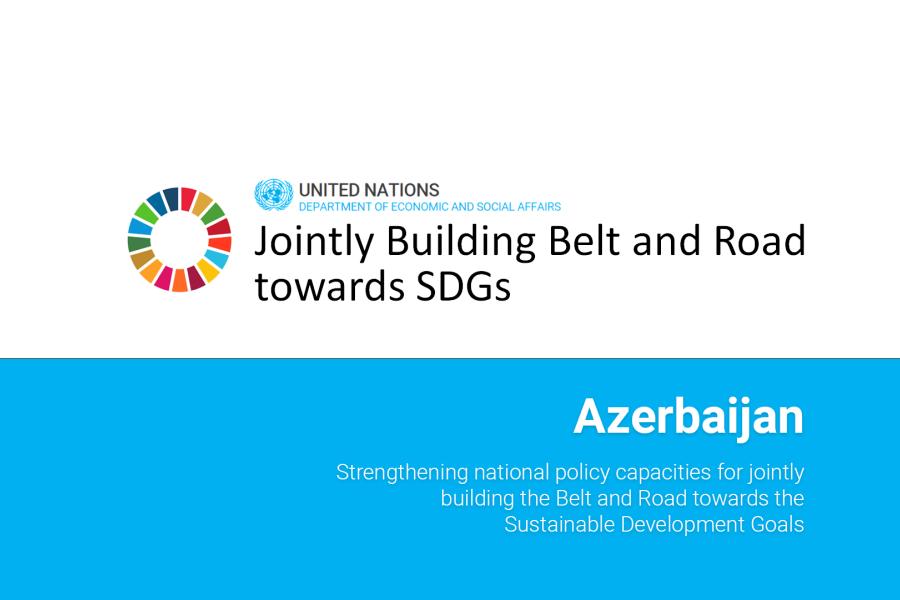UN project helps policy makers in Azerbaijan form sustainable development policies for Belt Road Initiative
13 October 2021
- Policy makers in Azerbaijan are now better equipped to understand the implications, benefits and possible risks of the Chinese Government’s Belt Road Initiative (BRI), thanks to a United Nations project which has recently completed activities, resulting in a national analysis report.

Over two years, the project worked with policy makers in Azerbaijan to build their capacity in forming economic and sustainable development policies in relation to BRI, an initiative linking countries and seas across Asia, Europe and beyond, with huge potential for economic development.
The BRI-SDG project, implemented by the UN Department of Economic and Social Affairs, and funded by the UN Peace and Development Fund, trained technical staff and policy makers in Azerbaijan and thirteen other pilot countries. Workshops focused on how to design clear and integrated macroeconomic, social and environmental policies which align with the United Nations’ Sustainable Development Goals (SDGs) and the 2030 Agenda for Sustainable Development.
‘To harness the opportunities brought by major regional initiatives like the BRI, Member States need to better assess the potential impacts of such initiatives, explore possible policy scenarios and develop integrated policies to optimize their impacts while managing the potential risks,’ Said Mr. Liu Zhenmin Under-Secretary-General for Economic and Social Affairs, ‘This will require enhancing the capacity of national policymakers and experts in data collection and analysis to support the evidence-based policy making.’
The project used the World Economic Forecasting Model to run simulations of the impact of various types of investments, including BRI infrastructure investments, in Azerbaijan. A national report was then produced from this analysis.
The simulation found that Azerbaijan could be driven by faster investments and consumption growth, resulting in GDP growth. Labour force participation may also increase, potentially leading to greater increases in output. The report highlights how Azerbaijan has embraced the UN’s Sustainable Development Goals, developing national sustainable development strategies and plans. However, SDG financing requires extensive mobilization of public and private resources.
It is recommended that practicing best standards and sharing training and lessons learned on the links between BRI and SDG’s will further boost the impact of BRI activities on sustainable development in Azerbaijan. Greater benefits will also be evident if the country takes steps to actively track BRI activities and their integration with SDGs.
The report also recommends that evidence-based policymaking, derived from quality research and applied analysis, may be instrumental in producing better policy options, reducing poverty, stimulating economic growth, and enhancing the quality of life in Azerbaijan.
Azerbaijan was one of fourteen BRI countries which participated in the project. Full results of the simulations are outlined in a global report and each of the 14 country reports.
Overall analysis of the fourteen countries shows that BRI investments were found to have a positive impact in the early years if the size of the investment is significant enough. Beyond this, the risk of debt distress or environmental costs and the effects on other SDG indicators such as poverty and gender equality, will depend on the effectiveness of policy measures taken in each country.
About BRI-SDG - The Economic Analysis and Policy Division (EAPD) of the United Nations Department of Economic and Social Affairs (UNDESA) implemented a multi-country, multi-year project to strengthen national capacities for jointly building the Belt and Road towards the Sustainable Development Goals. The project activities focused on training of policy-makers and technical staff to enhance their analytical capacities in designing coherent and integrated macroeconomic, social and environmental policies and promoting the achievement of the SDGs. Analytical and modelling tools, tailored to country needs, were used to facilitate the implementation of capacity development activities and strengthen the capacity of policy makers to integrate macroeconomic, environmental and social policies in national development strategies for achieving the goal of poverty eradication and other SDGs, under the broad context of implementing the 2030 Agenda.
Pilot countries: Azerbaijan, Bangladesh, Cambodia, Czech Republic, Georgia, Kazakhstan, Kyrgyz Republic, Lao PDR, Mongolia, Myanmar, Romania, Serbia, Sri Lanka and Thailand.
BRI-SDG website - https://www.brisdgs.org
Azerbaijan Country Report: https://www.brisdgs.org/project-countries/azerbaijan
Contact: Namsuk Kim, DESA, kimnamsuk@un.org

















